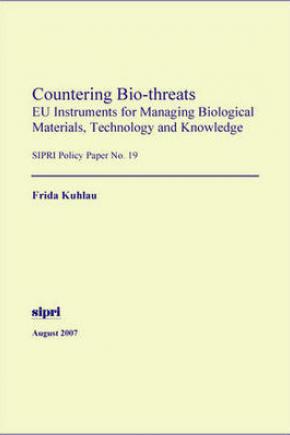Countering Bio-threats: EU Instruments for Managing Biological Materials, Technology and Knowledge
Efforts to counter threats posed by non-state actors, including bioterrorism, have led to the recognition that public health professionals need to become more aware of and sensitive to counterterrorism concerns. As new and more effective instruments are sought to prevent biological proliferation threats, it is likely to become increasingly difficult to draw a sharp line between actions needed in the public health and security sectors.
This Policy Paper draws on research that was carried out as part of a pilot project conducted by SIPRI to investigate how the common instruments of the European Union (EU) can support and reinforce actions taken by individual European governments (acting on their own or through intergovernmental cooperation) against the proliferation of nuclear, biological and chemical (NBC) weapons. That project investigated what could be done outside the EU to reduce the danger of NBC weapon proliferation. This paper mainly examines internal measures to protect Europeans from health threats caused by the deliberate use of disease.
The author, Frida Kuhlau, in 2006 carried out a survey of the role of the EU's Community pillar in the different projects, programmes and initiatives that are under way in the EU to reduce the security risks from microorganisms and toxins. The complex picture that emerges shows the changes that are taking place as various actors—some old, some new—are combining in untried and innovative ways to develop and implement common solutions to security problems very different from those that Europeans are accustomed to facing. Kuhlau suggests that the EU has not yet found a satisfactory framework for managing bio-security risks, and that further work on prevention should be a particular priority.
1. Introduction
2. EU internal actions: prevention, preparedness and response
3. EU external actions: limitations and possibilities
4. Assessing current efforts to manage the threat of biological proliferation

